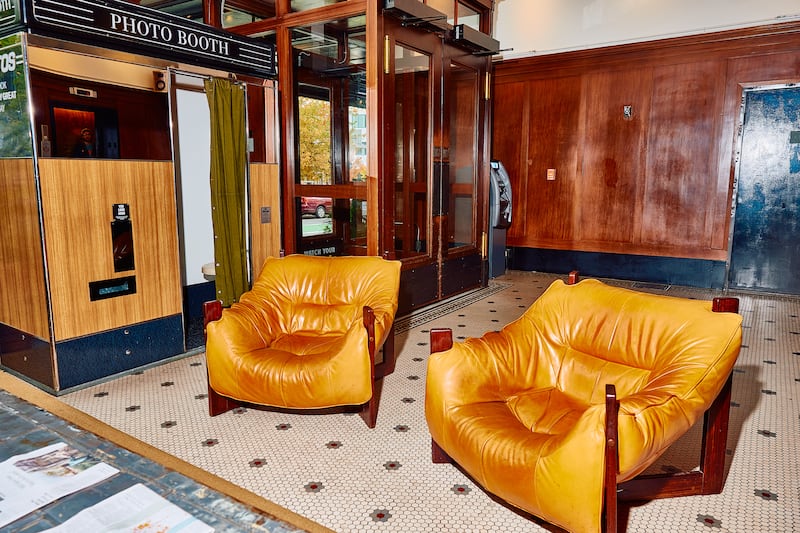In July 2022, Portland food blogger Meg Cotner broke some news: Water Avenue Coffee, the highly touted, independent Portland roaster, would open a shop in a storefront at 4615 NE Sandy Blvd.
“They posted a barista job listing on Poached about a couple of weeks ago, so they are definitely getting closer to opening,” Cotner wrote. “Water Avenue is one of my favorite cafes in Portland. Their coffee is delicious.”
Sixteen months later, faded butcher paper still covers the windows.
The landlord isn’t thrilled with the lack of progress. “Around Sept. 20, 2022, things came to a complete stop,” says Mike Loar, whose family owns the building.
Worse, Loar says Water Avenue’s parent company, Portland-based Sortis Holdings, failed to pay rent for October.
“I am definitely concerned,” Loar says. “The thing that bothers me is the lack of communication on the lease. I’ve sent two emails to Sortis and I’ve gotten nothing back.”
Cotner’s excitement about Water Avenue Coffee moving into Hollywood mirrors the way many Portlanders feel about the companies Sortis owns: Bamboo Sushi, Sizzle Pie, Rudy’s Barbershops, and other pillars of local indie culture.
Many signature Portland institutions are no longer independently owned. Instead, they are part of a stable of brands acquired over the past three years by Sortis Holdings, led by Paul Brenneke.
As WW, The Oregonian and the Portland Business Journal reported last week, Sortis faces the collapse of a hotel deal the company said was key to its future, and a spate of new lawsuits for unpaid bills and the alleged wrongful termination of a top manager.
Patrons of Sortis-owned businesses now wonder about the fate of treasured brands. And landlords wonder whether they’ll get paid.
“I hold no ill will against them. I’m hoping it all works out for the best,” Loar says. “I’m hoping they double down and focus on what they have.”
A Sortis Holdings spokesperson declined to respond to specific questions about Mike Loar’s building in Hollywood or the lawsuits, instead issuing a statement.
“Our beloved local venues employ over 1,500 individuals, providing essential benefits and allowing them to contribute to Portland’s vibrancy,” Sortis said. “However, sensationalist news undermines this progress, adding stress and jeopardizing our recovery, making it harder to fulfill our commitments and support our partners.”

The name Sortis Holdings may not register for most Portlanders. But in addition to Bamboo, Sizzle Pie and Rudy’s, Sortis owns restaurants such as Ava Gene’s, Tusk, Cicoria, See See Motor Coffee and, through an affiliate, Portland’s Ace Hotel.
For the past three years, Brenneke, Sortis’ executive chairman, has assembled a collection of consumer-facing businesses as the region recovers from the pandemic (Sortis has extensive holdings in Seattle as well). But the recent lawsuits suggest Sortis’ plan may not be working.
As recently as Nov. 2, a contractor sued a Sortis affiliate in Multnomah County Circuit Court, alleging unpaid bills for the buildout of a Sizzle Pie restaurant. Records show it’s the fourth lawsuit filed against Sortis or an affiliate since Sept. 15.
On Nov. 3, the Portland Business Journal reported that Sortis’ acquisition of the boutique hotel chain Ace Group International, announced in January, had failed after litigation with the seller. Sortis told the Business Journal it was laying off 30 employees (2% of its workforce) but would continue stronger than ever.
Brenneke is a scion of a Portland real estate family and, prior to founding Sortis, a longtime commercial real estate developer. Among his top executives at Sortis are chief financial officer Ryan Smith, a former senior Nike finance manager, and Sortis’ culinary chief, the chef and cookbook author Joshua McFadden. (McFadden founded Portland’s Submarine Hospitality group, which includes the Portland restaurants Tusk, Ava Gene’s and Cicoria.)
Brenneke-led funds took advantage of the pandemic, investing in Blue Star Donuts and acquiring Bamboo Sushi’s parent, the Sustainable Restaurant Company. At the end of 2021, Brenneke reorganized his companies and continued buying.
Ken Batali, a Seattle-area restaurant consultant who also works in Portland, says the Sortis model—bringing service businesses like restaurants, coffee shops and barbershops under one roof—holds some appeal for investors.
“On paper, it’s great,” Batali says. “The businesses share accounting and other back office services. The risk is, you have your hands in a multitude of businesses and it’s hard to be an expert in all of them.”
Sortis announced its biggest acquisition in January, when it said it was paying $85 million cash for Ace Group International, which included Ace hotels in Brooklyn, Los Angeles, Kyoto, Sydney and other cities.
“The Sortis platform is rooted in innovation, purpose, and impact, and aims to foster consumer brands that are at the forefront of culture,” Brenneke said in a statement at the time.
Throughout 2023, as the Business Journal reported, Sortis and the Ace chain’s owners sparred over the terms of their deal in Delaware court.
The first local public record suggesting that Sortis’ strategy might not be working came in September, as part of a lawsuit filed in Multnomah County Circuit Court by Michelle Andersen, who says she ran Bamboo Sushi for Sortis. In legal filings, Andersen explained the circumstances behind her wrongful termination claim. (Sortis told The Oregonian the lawsuit lacks merit.)
Andersen alleges she built Bamboo into “the largest asset and revenue source on Sortis’ consolidated financial statements.” Sortis took good care of her, promised her stock worth about $1.5 million, and paid her a salary of $325,000 with the expectation of a 40% bonus, she says.
But in June 2023, Andersen alleges in her lawsuit, Brenneke told her she had to go, attributing the decision to overexpansion in the coffee business, in which she was also involved.
Andersen further claims in the lawsuit Brenneke told her he could not afford to pay her severance of six months’ salary and 12 months’ health insurance. Andersen also claims Sortis never paid her the $1.5 million in stock she was promised.
Andersen’s lawsuit was followed by three subsequent, unrelated lawsuits and one contractor’s lien in Multnomah County, all of which would appear to support Andersen’s contention that Sortis is struggling.
On Oct. 6, a company called Hancock PDX filed a lawsuit in Multnomah County, alleging that Coffee Business LLC, a Sortis affiliate whose lease the parent company guaranteed, stopped paying its $25,000 monthly rent after July. That triggered a default, and Hancock says the lease required Coffee Business LLC to pay abated rent, penalties and other costs totaling about $260,000. (Sortis told The Oregonian it has resolved that dispute.)
On Oct. 27, a company called Thirteenth Avenue LLC filed suit in Multnomah County against Sortis Barbershops LLC, seeking to evict Rudy’s Barbershop in Sellwood for alleged nonpayment of rent. (A hearing on that is scheduled Nov. 15.)
On Oct. 30, Green Gables Design and Restoration Inc. filed a contractor’s lien against Sortis Ace PDX RE LLC, which owns the Ace Hotel, with the Multnomah County recorder’s office, seeking $75,518 for work at the hotel on Southwest Harvey Milk Street.
In the lawsuit filed Nov. 2, a firm called Bartel Contracting sued Sortis Holdings and a Sortis affiliate called Nice Chip LLC. The Sortis affiliate hired Bartel to build out a Sizzle Pie pizza restaurant in Hillsboro this summer. When the job was finished in July, the lawsuit alleges, Sortis/Nice Chip asked Bartel to extend payment terms. In an agreement attached to the lawsuit and signed by Brenneke, Sortis agreed to pay the full amount by Sept. 30—including interest at a steep 12%. Brenneke also agreed to pay an extra 10% if his company didn’t meet the Sept. 30 payment date. Sortis allegedly missed that deadline and Bartel is now suing for $239,000.
It’s not uncommon for a company to pay a bill a little late. But Sortis’ problems may be bigger than that. The Business Journal noted that Sortis’ financial condition was an issue in the litigation in the failed Ace Hotels acquisition: “Ace’s owners argued Sortis Holdings ‘did not have sufficient cash on hand to tender the closing date payment.’ Meanwhile, Sortis Holdings claimed the owners had cut a side deal with a separate company that imperiled the acquisition’s long-term success.”
Sortis Holdings’ stock, which trades over the counter, has slumped to 25 cents a share, down from $1.98 in January.

Out-of-town investors have regularly snapped up Portland brands, including Dave’s Killer Bread, Stumptown Coffee and Voodoo Doughnut. What’s different with Sortis is that it’s based here.
Although all involved parties generally say that corporate ownership won’t change anything, that’s hard to ensure.
Scott Gilkey, a Northwest restaurant consultant, says transitioning from chef or founder ownership to investor ownership is hard to pull off. “There’s always something lost,” Gilkey says, “because people who are in it for a financial return don’t have the same passion as somebody who built the business themselves.”
Consolidation can go wrong. In 2019, Seattle-based Restaurants Unlimited, which owned 35 restaurants in six Western states, including the Portland City Grill, Henry’s Tavern and Stanford’s locally, went bankrupt. A national operator, Landry’s, bought the chain’s assets. Portland City Grill still spins atop the U.S. Tower, but Stanford’s at Lloyd Center and Henry’s in the Pearl are dark.
Sortis says it is in fine shape and will only grow stronger. “We’re nearing a sustainable model, after a voluntary withdrawal from our agreement to purchase the Ace brand, that promises more jobs and benefits in our community,” Sortis said. “We are not a faceless corporation but a collective of original owners and entrepreneurs committed to aiding the post-pandemic recovery of Portland’s struggling hospitality and culinary sector. The depiction of us as a corporate entity has negative repercussions for those who fear for their jobs due to such narratives.”
Meg Cotner hopes Sortis succeeds: “I’m still excited about the idea of Water Avenue Coffee opening in Hollywood.”

